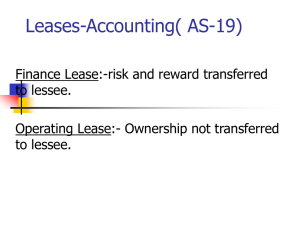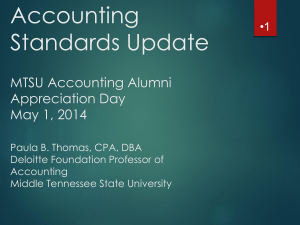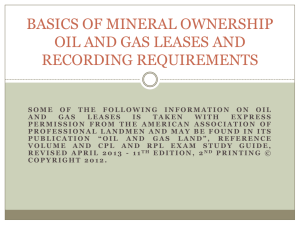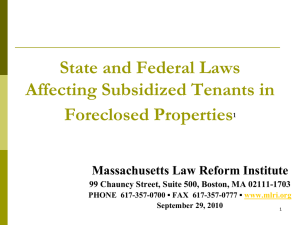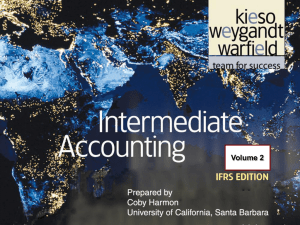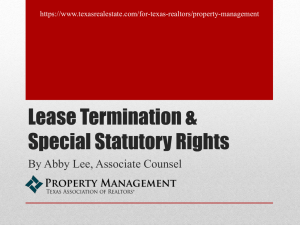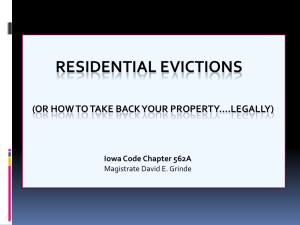NT - William Forster Chambers
advertisement
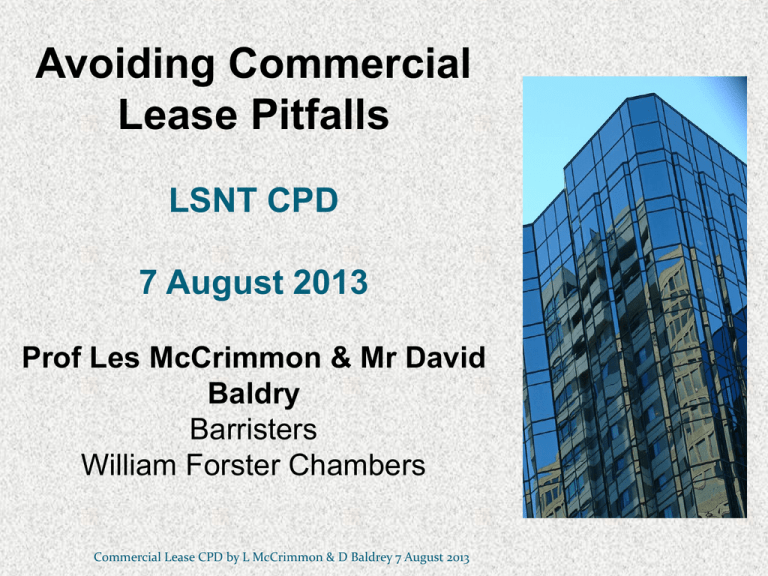
Avoiding Commercial Lease Pitfalls LSNT CPD 7 August 2013 Prof Les McCrimmon & Mr David Baldry Barristers William Forster Chambers Commercial Lease CPD by L McCrimmon & D Baldrey 7 August 2013 Focus of Discussion Essential elements of a lease Notice to Quit Notice re right of re-entry Limitations on the lessee’s covenant to repair Covenant to keep in good repair Fair wear and tear Options to purchase Deemed subdivision under the Planning Act (NT) Commercial Lease CPD by L McCrimmon & D Baldrey 7 August 2013 Definition of a Lease A lease is the grant of the right to exclusive possession of land for a fixed or determinate term (Radaich v Smith (1959) 101 CLR 209 at 222) The term must be for a period less than the term for which the grantor (lessor) holds the land. Commercial Lease CPD by L McCrimmon & D Baldrey 7 August 2013 Exclusive Possession Exclusive Possession Grant: Rights: Subject to: General right to exclude others including lessor Specific provisions in lease re entry Statutory powers of lessor – eg: Law of Property Act s 119 Commercial Lease CPD by L McCrimmon & D Baldrey 7 August 2013 Right to remove trespassers Action for injury to reversion – damages; injunction Indicators of Exclusive Possession Right conferred on grantor to enter and view, or to carry out repairs If not a lease, such rights unnecessary Covenant for quiet enjoyment indicates grantee has exclusive possession Commercial Lease CPD by L McCrimmon & D Baldrey 7 August 2013 Commencement of Lease Lease commences on the date specified in the lease, and if no date is specified, it will be presumed to commence on the date the lease is executed. Date of commencement must be certain when lease is agreed to, or if not, must become certain before the lease comes into effect – eg, when the construction of a building is completed. Commercial Lease CPD by L McCrimmon & D Baldrey 7 August 2013 Conditional Lease A lease to take effect in the future is referred to as a “reversionary lease”. Note: Law of Property Act (NT) s 115 – provides that a lease stated to take effect more than 21 years from date of the instrument purporting to create it is void (s 115(3), and any contract purporting to create such a term is also void (s 115(4)). Commercial Lease CPD by L McCrimmon & D Baldrey 7 August 2013 Requirement of Writing A lease for a long term of years (eg, more than 3 years) must be in writing: LPA (NT) s 10(1). The LPA (NT) s 62 prohibits an action being brought to enforce an agreement for lease unless the agreement is evidenced in writing. A lease for 3 years or less which takes effect in possession is not required to be in writing: LPA (NT) s 10(2). Commercial Lease CPD by L McCrimmon & D Baldrey 7 August 2013 Other Essential Elements Names of contracting parties and the identity of the demised premises must be clear. While the designation of rent is not an essential element of a lease, where the lease is in deed form some consideration must be provided by the tenant in return for the grant of the lease. Eg, see LPA (NT) s 47 (deed executed by natural person), s 48 (deed executed by corporation). Commercial Lease CPD by L McCrimmon & D Baldrey 7 August 2013 Notice to Quit Notice to quit governed by LPA (NT) ss 145-151. Notice to terminate may be either oral or in writing (s 146(1)). Note – lessor cannot relay on an oral notice to enforce a right of ejectment should lessee fail to comply with notice. Commercial Lease CPD by L McCrimmon & D Baldrey 7 August 2013 Written Notice Form and content of notice governed by LPA (NT) s 146 Written notice must: be signed by the person giving the notice or his/her agent; Agent should have authority at time of signing notice, and generally notice should also contain name of principal clearly identify the leased premises; state either that the tenancy is to terminate on the last day of the period of tenancy next following the giving of the notice or the date of that day. Eg, monthly tenancy which begins on first of month – if notice given on 7 August cannot expire before 30 September. Best practice is to stipulate a specific date which complies with s 146(2)(c). Commercial Lease CPD by L McCrimmon & D Baldrey 7 August 2013 Manner of Giving Notice Governed by LPA (NT) s 147. Notice can either be given by delivering the notice personally to the tenant or the landlord or the landlord’s agent as the case may be (s 147(1)); or By giving notice in accordance with s 147(2)(a)-(d) if the tenant is absent from the premises or is evading service, or s 147(3) if the tenant has died and probate or letters of administration have not been granted Section 147 does not purport to be a code (s 147(6)), however if another method of giving notice is used it must be capable of satisfactory proof. Commercial Lease CPD by L McCrimmon & D Baldrey 7 August 2013 Notice re Right of Re-entry In the NT, no right of re-entry on the lessee’s breach of a covenant, obligation, condition or agreement in the lease can be exercised without a court order or unless the tenant abandons or voluntarily gives up possession of the premises (LPA (NT) s 137(1)). The contents of the notice arising from the lessee’s breach is governed by LPA (NT) s 137(2). Commercial Lease CPD by L McCrimmon & D Baldrey 7 August 2013 Contents of the Notice The s 137 LPA (NT) notice must: Specify the particular breach complained of; If the breach can be remedied, require the lessee to remedy; If the lessor claims compensation in money for the breach, require the lessee to pay the compensation. The notice must do more than simply quote the covenant breached. It must give the lessee sufficient details of the breach so that the lessee can (if possible) remedy the breach. The notice does not have to go so far as to instruct the lessee as to how the breach can be remedied: Gerraty v McGavin (1914) 18 CLR 152 at 164-165. Commercial Lease CPD by L McCrimmon & D Baldrey 7 August 2013 Limitations on Lessee’s Covenant to Repair A limitation on the damages recoverable for a breach of covenant to repair either during, or on the termination of, the lease is contained in s 123 LPA (NT). Provides that the damages recoverable “are not to exceed the amount (if any) by which the value of the reversion … is diminished owing to the breach of the covenant …”. The section requires the court to ascertain the actual value of the property at the date of re-entry and the value which the property would have had if there had been no breach. The difference is the amount of damage sustained by landlord: Hanson v Newman [1934] 1 Ch 298 at 305. Commercial Lease CPD by L McCrimmon & D Baldrey 7 August 2013 Example – s 123 Premises worth $500,000 in state of disrepair and $600,000 if restored to good and tenantable standard of repair. Amount by which value of reversion has diminished is $100,000. If actual cost of repairs is $250,000, the lessor only will be able to recover $100,000, being the amount by which the reversion is diminished, not the cost of repair ($250,000). Commercial Lease CPD by L McCrimmon & D Baldrey 7 August 2013 Further . . . If it can be shown that at or shortly after the termination of the lease the premises in whatever state of repair they might be would be or have been pulled down, or structural alterations have been made to the premises that would render valueless the repairs, no damages are recoverable for the breach of covenant to repair: s 123(2) LPA (NT). A right of re-entry or forfeiture for a breach of covenant to repair referred to in s 123(1) or (2) is not enforceable unless the lessor proves that an effective notice has been served and a “period of time reasonably sufficient to enable the execution of the repairs has lapsed”: s 123(3)(b) LPA (NT). Commercial Lease CPD by L McCrimmon & D Baldrey 7 August 2013 Covenants to Keep and Yield up in Good Repair, Make Good and the Fair Wear and Tear Exception Usually based on condition at commencement, excluding damage by Acts of God Lessee’s obligation to keep in repair during term and yield up in good repair implied unless otherwise agreed – see Law of Property Act, NT, s 117(1)(c) Commercial Lease CPD by L McCrimmon & D Baldrey 7 August 2013 Repair (contd) Commencement condition important Requires tenant to perform regular maintenance, objective test – Alcatel Australia Ltd v Scarcella, (1998) 4 NSWLR 349 at 354 Fair, wear and tear exception – Lessee’s burden of proof Be careful clause does not require tenant to put the premises into good repair at commencement Repair (contd) Question of degree whether repair or rebuilding or new improvement But if repair needed requires making improvements doing so will be required – Graham v Markets Hotel Pty Ltd, (1943) 67 CLR 567 at 579 Repair (contd) Disrepair at Beginning – inherent defects do not fall within repair covenant dicta by Jordan CJ in Graham v Markets Hotel In NT S/Court can relieve tenant from obligation to perform decorative repairs if unreasonable – see Law of Property Act (NT) s 141 (1) and (2) Repair (contd) Structural defect exclusion may only apply to load bearing integrity – Carbure Pty Ltd v Brile Pty Ltd (2002) Conv R 54-663; yet see J F Hillam Pty Ltd v Mooney (1988) SASR 381 (where repair of marblesheen coating on swimming pool deemed structural); and Alamdo Holdings Pty Ltd v Australian Window Furnishings (NSW) Pty Ltd [2004] NSWSC 487 at [42] per Barrett J (where repair of asphalt laid on land surface over base course of aggregate deemed structural) Fair, Wear and Tear Exception Taylor v Webb [1937] 1 All ER 590 “Fair” synonymous with “reasonable”, “wear and tear” means effect to premises due to normal or ordinary operation of natural forces Haskell v Marlow [1928]2 KB 45 overturned - tenant not obliged to effect repairs to prevent initial disrepair due to wear and tear becoming worse. Fair Wear and Tear (contd) Onus on tenant to establish FWT even if want of repair – Brown v Davies [1957] WLR 818 at 825-826 – long term residential tenant where interior became dilapidated, held FWT exception does not entitle tenant to do nothing Usually read ‘keep in repair’ clause throughout with ‘make good’ – Bunyip Buildings Pty Ltd v Gestetner Pty Ltd [1969] SASR 87 at 98-99 Option to Purchase Option to purchase is conditional contract to purchase reversion on lessee giving notice If exercise end date not stated, inferred can only be exercised during lease term – Trustees and Executors and Agency Co Ltd v Peters (1960 102 CLR 537 at 553-554 per Menzies J If landlord transfers title option does not bind new owner unless lease registered Can probably be protected by caveat - Transfield Properties (Kent Steel) PL v Amos Aked Swift (1994) 36 NSWLR 321 at 341, but is probably unnecessary in the NT because of the Court relief powers in s. 143 of the Law of Property Act Exercise of Options Often unenforceable for uncertainty if essential contract of sale terms vague or missing Must be exercised by all lessees Ensure all requirements of exercise are performed – eg often need to pay deposit when serving notice Avoid using phrase “upon exercise of option” Bowman v Durham Holdings Pty Ltd (1973) 131 CLR 8 at 16 per Stephen J because ‘upon’ could mean ‘before’, simultaneously with’ or ‘after’ Exercise of Option (contd) Better to serve notice personally Yet under s. 219 Law of Property Act can also be served by: Leaving at or posting to last known place of residence; or Leaving at or posting to last known place of business; If a company, by post to its registered office; If by post, unless the contrary is shown, deemed served in the ordinary course of post. Exercise of Option (contd) Ordinary course of post date depends on usual postal delivery in area – Bowman’s case Right of First Refusal Pre-emption right obliging lessor not to deal with land without firstly offering to sell to lessee Not interest in land and not caveatable Usually damages only remedy But arguable becomes an interest in land if lessor makes offer to sell the land to third party – Jonns v Tan (1999) 9 BPR 17,113 at 17,115 May be able to get interim injunction to stop on sale to 3rd party if can show 3rd party knew of terms of first right of refusal Unenforceable if sale terms vague Deemed subdivision under Planning Act (NT) S. 5 Planning Act, NT prohibits leases of part of land without subdivision approval if term, incl any options, > 12 years; s. 63(2) makes lease void. Exception for leases of parts of a building s.5(3)(b). However, if clause contains pre-condition (e.g. landlord having to firstly decide to redevelop the premises) not a true option – Rosebridge Nominees PL v Commonwealth Bank of Australia (2008) 36 WAR 561 at [19] and will not be caught by s 5. Deemed subdivision (contd) Finlay Stonemasonry PL v JD & Sons Nominees PL atf Jenkins Family Trust No 2 [2011] NTCA 7 dealt with whether part of building exception applies to single story buildings. Depends on particular term of lease and common intention of parties (Pacific Carriers Ltd v PNB Paribas [2004] HCA 35; 218 CLR 451 at [22] Court of Appeal held parties had common intention to lease a café in part of building. Deemed subdivision (contd) Rejected Appellant’s argument not part of building as a single storey building, impliedly included land below floor and air above roof Floor plan contained 2 separate areas of interior of café and verandah, excluding walls Lesson –when drafting leases of parts of buildings use air space definition of premises used in shopping centre leases Les McCrimmon & David Baldry William Forster Chambers 26 Harry Chan Avenue · GPO Box 4369 Darwin · NT t +61 8 8982 4700 f +61 8 8941 1541 e lmccrimmon@williamforster.com Commercial Lease CPD by L McCrimmon & D Baldrey 7 August 2013


